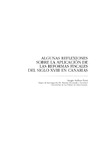Please use this identifier to cite or link to this item:
https://accedacris.ulpgc.es/jspui/handle/10553/17132
| DC Field | Value | Language |
|---|---|---|
| dc.contributor.author | Solbes Ferri, Sergio | en_US |
| dc.date.accessioned | 2016-05-26T02:30:37Z | |
| dc.date.accessioned | 2018-02-21T14:20:52Z | - |
| dc.date.available | 2016-05-26T02:30:37Z | |
| dc.date.available | 2018-02-21T14:20:52Z | - |
| dc.date.issued | 2014 | en_US |
| dc.identifier.uri | https://accedacris.ulpgc.es/handle/10553/17132 | - |
| dc.description.abstract | La existencia de un proceso de creciente uniformización fiscal en la España del siglo XVIII es una circunstancia comúnmente admitida por la historiografía tradicional. Esta realidad deriva en buena medida de la equiparación con la fiscalidad castellana de los reinos aragoneses tras la guerra de Sucesión. En este artículo pretendemos recordar que existen otros muchos territorios que forman parte de la monarquía hispánica que no pueden ni deber ser incluidos en este supuesto. Es el caso de Canarias, territorio fiscalmente privilegiado desde el mismo momento de su conquista, que supo mantener sus prerrogativas y sus privilegios en materia tributaria durante todo el siglo XVIII. Esta realidad no significa sin embargo que este mismo territorio no se viera sometido a un simultáneo proceso de integración administrativa y de gestión de rentas que acabará por otorgar una configuración muy distinta a la Real Hacienda en las Islas Canarias. | en_US |
| dc.description.abstract | The presence of a process of growing fiscal standardization in eighteenth-century Spain is a commonly accepted fact by traditional historiography. This reality stems from the well know fiscal reform executed in the kingdoms of the Crown of Aragon after the War of Succession. In this article, we try to remember that there are many other areas, part of Spanish Monarchy, which cannot be included in this course. That is the special case of the Canary Islands, territory fiscally privileged since the first moment of its conquest, which would be able to maintain its prerogatives and privileges in tax matters throughout the eighteenth century. This reality does not mean, however, that the same area did not be simultaneously included into a process of administrative integration and management of real income that will eventually give it a very different configuration. | en_US |
| dc.format | application/pdf | es |
| dc.language | spa | en_US |
| dc.rights | by-nc-nd | es |
| dc.source | Economía y marco institucional (siglos XVI-XX) / Santiago Luxán Meléndez (dir.). --, Las Palmas de Gran Canaria: Fundación Mapfre Guanarteme, 2014. -- pp. 139-158 | en_US |
| dc.subject | 5301 Política fiscal y hacienda pública nacionales | en_US |
| dc.subject.other | Hacienda | en_US |
| dc.subject.other | Canarias | en_US |
| dc.subject.other | siglo XVIII | en_US |
| dc.subject.other | España | en_US |
| dc.subject.other | Reformas administrativas | en_US |
| dc.subject.other | Uniformización fiscal | en_US |
| dc.subject.other | Spain | en_US |
| dc.subject.other | Canary Islands | en_US |
| dc.subject.other | 18th Century | en_US |
| dc.subject.other | Royal Finances | en_US |
| dc.subject.other | Tax Standardization | en_US |
| dc.subject.other | Administrative Reforms | en_US |
| dc.title | Algunas reflexiones dobre la aplicación de las reformas fiscales del siglo XVIII en Canarias | en_US |
| dc.type | info:eu-repo/semantics/bookPart | en_US |
| dc.type | BookPart | es |
| dc.type | BookPart | es |
| dc.identifier.absysnet | 723680 | - |
| dc.identifier.crisid | 290 | |
| dc.rights.accessrights | info:eu-repo/semantics/openAccess | es |
| dc.type2 | Capítulo de libro | en_US |
| dc.identifier.external | 290 | - |
| dc.identifier.ulpgc | Sí | es |
| item.grantfulltext | open | - |
| item.fulltext | Con texto completo | - |
| crisitem.author.dept | GIR IATEXT: Documentación, Patrimonio e Historia Atlántica | - |
| crisitem.author.dept | IU de Análisis y Aplicaciones Textuales | - |
| crisitem.author.dept | Departamento de Ciencias Históricas | - |
| crisitem.author.orcid | 0000-0002-1465-9725 | - |
| crisitem.author.parentorg | IU de Análisis y Aplicaciones Textuales | - |
| crisitem.author.fullName | Solbes Ferri, Sergio | - |
| Appears in Collections: | Capítulo de libro | |
Page view(s)
239
checked on Jan 16, 2026
Download(s)
104
checked on Jan 16, 2026
Google ScholarTM
Check
Share
Export metadata
Items in accedaCRIS are protected by copyright, with all rights reserved, unless otherwise indicated.
